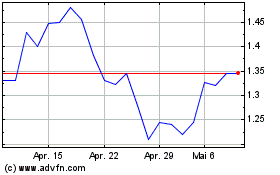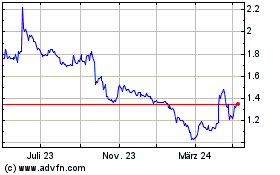Regulatory News:
Transgene (Euronext Paris: TNG) (Paris:TNG), a biotech
company that designs and develops virus-based immunotherapies for
the treatment of cancer, today announced that it presented updated
preliminary Phase I data on TG4050, its individualized neoantigen
cancer vaccine, in a poster session at the American Society of
Clinical Oncology (ASCO) annual meeting. TG4050 is based on
Transgene’s myvac® platform and powered by NEC’s cutting-edge AI
capabilities.
These additional positive initial data, including molecular
(ctDNA) response, have been generated from the first patients with
ovarian cancer and HPV-negative head and neck cancer enrolled in
the two ongoing Phase I trials assessing TG4050. They were
presented in-person in Chicago, IL, June 5, 2022.
“These new results, though early, are very encouraging” said
Dr. Maud Brandely, MD, PhD, Chief Medical Officer of
Transgene. “So far we accumulated promising preliminary data
with TG4050: good tolerability, consistent immunogenicity and
encouraging molecular response. We are particularly impressed by
the effective priming of the immune system and the early signs of
clinical activity. These results suggest that our individualized
vaccine, TG4050, has the potential to extend the remission period,
thus providing a new hope for cancer patients. In addition, the
information we gather from the two ongoing Phase I studies will be
pivotal in designing the Phase II trial of TG4050 which could start
as early as 2023.”
Prof. Jean-Pierre Delord, MD, PhD, General Manager of IUCT
Oncopole of Toulouse and first author of the poster, added:
“Neoantigen vaccination such as TG4050 is a relevant strategy for
the treatment of patients with high risk of cancer relapse for whom
the medical need is particularly high. In this setting, the vaccine
is expected to deliver clinical benefit by controlling the residual
disease. To date, this non-invasive treatment is well tolerated by
the patients and although preliminary, the data presented at ASCO
clearly suggest that TG4050 could become a new treatment option for
cancer patients. I am looking forward to seeing this potential
game-changing therapy moving forward.”
For the first time, ctDNA data were generated following
treatment with TG4050
Liquid biopsies were performed to measure the circulating tumor
DNA (ctDNA) levels. ctDNA is an emerging modality that is used to
detect subclinical disease or asymptomatic relapse in an increasing
number of indications. Use of such highly sensitive and specific
marker seeks to identify patients whose disease is very likely to
relapse in the near future, before their disease becomes detectable
with current standard methods such as imaging. Moreover, it allows
a non-invasive monitoring of treatment effectiveness. For instance,
in at least one ovarian cancer patient in the study, a decline in
ctDNA was concomitant with CA-125 normalization and disease
control. Analyses are ongoing in more recently included
patients.
Clinical follow-up data continue to demonstrate the potential of
TG4050 in ovarian and head and neck cancer patients
In the head and neck cancer trial, patients were
randomized to immediately receive vaccination with TG4050 (early
treatment arm, arm A) or at relapse (delayed vaccination arm, arm
B). All evaluable patients randomized to arm A (n=8) are still
in complete response as of mid-May 2022. In arm B (n=8), two
patients have experienced relapse.
In the ovarian cancer trial (n=5), a fifth patient initiated
her treatment with TG4050 recently. One patient treated after
an elevation of CA-125 experienced a normalization of CA-125
without clinical progression for 9 months until death from an
unrelated chronic illness. Another patient was treated upon onset
of radiological evidence of relapse and remained stable for 11.4
months.
To date, the vaccine has been well tolerated and no related
Serious Adverse Events have been reported across the two
studies.
In both clinical studies, enrollment and patient dosing are
progressing in line with our expectations. Overall, Transgene
plans to treat 13 patients in the ovarian cancer trial and 30
patients in the head and neck cancer trial.
Immune cell response data demonstrated an effective priming of
the immune system which is associated with disease regression
Transgene presented a comprehensive set of immunological data at
ASCO. Circulating immune cells quantification (in particular
monocytes, DC, NK cells, subcells of CD8, CD4, Treg) and expression
of immune checkpoints (ICOS and PD1) suggest that the vaccine is
able to effectively induce innate and adaptive immune responses in
patients.
In an ovarian cancer patient, clinical resolution and
biological responses (CA-125 and ctDNA responses) were concomitant
to an immune response against multiple epitopes and to the onset of
markers of an effective immune response (switch in circulating
CD4 and CD8 cells toward an effector phenotype, increase in CD16neg
NK cells; peak in circulating cytokines).
All evaluable patients developed a robust T-cell response
against multiple targeted neoantigens (median of 10 positive
responses per patient). T-cell responses were observed for class I
and class II epitopes, they consisted of de novo responses and
amplifications of preexisting responses.
The poster can be downloaded from the ASCO and Transgene
websites.
Poster title: Phase 1 studies of personalized neoantigen
vaccine TG4050 in ovarian carcinoma (OC) and head and neck
carcinoma (HNSCC)
- Abstract number: 2637
- Session title: Developmental
Therapeutics—Immunotherapy
- Authors: J.P. Delord, M. Block, C.
Ottensmeier, G. Colon-Otero, C. Le Tourneau, A. Lalanne, O. Lantz,
KL. Knutson, G. Lacoste, A. Tavernaro, M. Brandely, N. Silvestre,
B. Grellier, Y. Yamashita, O. Kousuke, N. Yamagata, Y. Tanaka, B.
Malone, E. Quemeneur, K. Bendjama
***
About the clinical trials
TG4050 is being evaluated in two Phase I clinical trials for
patients with ovarian cancer (NCT03839524) and HPV-negative head
and neck cancers (NCT04183166).
In a first Phase I trial, TG4050 is being administered to
patients with HPV-negative head and neck cancer. A personalized
treatment is created for each patient after they complete surgery
and while they receive an adjuvant therapy. Half of the
participants receive their vaccine immediately after they complete
their adjuvant treatment. The other half is given TG4050 as an
additional treatment at the time of recurrence of the disease as an
additional treatment to SoC. This randomized study is evaluating
the treatment benefits of TG4050 in patients who have a high risk
of relapse. Up to 30 patients will receive TG4050 in France, in the
UK and in the USA. The principal investigator of the trial is Prof.
Christian Ottensmeier, MD, PhD, Consultant Medical Oncologist at
the Clatterbridge Cancer Centre and Professor of Immuno-Oncology at
the University of Liverpool. In France, the clinical trial is being
conducted at Institut Curie, Paris by Prof. Christophe Le Tourneau,
MD, PhD, Head of the Department of Drug Development and Innovation
(D3i), and at the IUCT-Oncopole, Toulouse by Prof. Jean-Pierre
Delord, MD, PhD. In the USA, the trial is being led by Yujie Zhao,
MD, PhD, at the Mayo Clinic. Endpoints of the trial include safety,
feasibility and biological activity of the therapeutic vaccine.
In parallel, a Phase I clinical trial of TG4050 is enrolling
patients with ovarian cancer. This second trial is including
patients at the time of asymptomatic relapse after surgery and
first-line chemotherapy. Matthew Block, MD, PhD, Consultant Medical
Oncology, Consultant Immunology and Associate Professor of Oncology
at the Mayo Clinic (USA) is the principal investigator of the
trial; in France, the trial is being conducted by Prof. Le
Tourneau, MD, PhD, at Institut Curie and by Alexandra Martinez, MD,
Associate Head of Surgical Department, at IUCT-Oncopole. Endpoints
of the trial include safety, feasibility and biological activity of
the therapeutic vaccine.
The first preliminary clinical data generated from the first
patients treated with TG4050 were very encouraging.
About myvac® myvac® is a viral vector (MVA – Modified
Vaccinia Ankara) based, individualized immunotherapy platform that
has been developed by Transgene to target solid tumors.
myvac®-derived products are designed to stimulate the patient’s
immune system, recognize and destroy tumors using the patient’s own
cancer specific genetic mutations. Transgene has set up an
innovative network that combines bioengineering, digital
transformation, established vectorization know-how and unique
manufacturing capabilities. Transgene has been awarded “Investment
for the Future” funding from Bpifrance for the development of its
platform myvac®. TG4050 is the first myvac®-derived product being
evaluated in clinical trials. Click here to watch a short
video on myvac®.
About TG4050 TG4050 is an individualized immunotherapy
being developed for solid tumors that is based on Transgene’s
myvac® technology and powered by NEC’s longstanding artificial
intelligence (AI) expertise. This virus-based therapeutic vaccine
encodes neoantigens (patient-specific mutations) identified and
selected by NEC’s Neoantigen Prediction System. The prediction
system is based on more than two decades of expertise in AI and has
been trained on proprietary data allowing it to accurately
prioritize and select the most immunogenic sequences. TG4050 is
designed to stimulate the immune system of patients in order to
induce a T-cell response that is able to recognize and destroy
tumor cells based on their own neoantigens. This individualized
immunotherapy is developed and produced for each patient.
About Transgene Transgene (Euronext: TNG) is a
biotechnology company focused on designing and developing targeted
immunotherapies for the treatment of cancer. Transgene’s programs
utilize viral vector technology with the goal of indirectly or
directly killing cancer cells. The Company’s clinical-stage
programs consist of two therapeutic vaccines (TG4001 for the
treatment of HPV-positive cancers, and TG4050, the first
individualized therapeutic vaccine based on the myvac® platform) as
well as two oncolytic viruses (TG6002 for the treatment of solid
tumors, and BT-001, the first oncolytic virus based on the
Invir.IO™ platform). With Transgene’s myvac® platform, therapeutic
vaccination enters the field of precision medicine with a novel
immunotherapy that is fully tailored to each individual. The myvac®
approach allows the generation of a virus-based immunotherapy that
encodes patient-specific mutations identified and selected by
Artificial Intelligence capabilities provided by its partner NEC.
With its proprietary platform Invir.IO™, Transgene is building on
its viral vector engineering expertise to design a new generation
of multifunctional oncolytic viruses. Transgene has an ongoing
Invir.IO™ collaboration with AstraZeneca. Additional information
about Transgene is available at: www.transgene.fr. Follow us on
Twitter: @TransgeneSA
About IUCT-Oncopole The IUCT-Oncopole, a cancer care,
research and training center in Toulouse, combines the expertise of
1,800 professionals on a single site labeled "Comprehensive Cancer
Center". It combines several state-of-the-art clinical facilities
for the treatment of cancer with a world-class research
infrastructure, on an integrated campus that brings together public
and private stakeholders, including industrial partners. The
IUCT-Oncopole, which includes the Claudius Regaud Institute (ICR)
and several teams from the Toulouse University Hospital, treats
more than 10,000 new patients every year, and more than one in
eight patients is enrolled in clinical studies.
www.iuct-oncopole.fr
Transgene disclaimer This press release contains
forward-looking statements, which are subject to numerous risks and
uncertainties, which could cause actual results to differ
materially from those anticipated. The occurrence of any of these
risks could have a significant negative outcome for the Company’s
activities, perspectives, financial situation, results, regulatory
authorities’ agreement with development phases, and development.
The Company’s ability to commercialize its products depends on but
is not limited to the following factors: positive pre-clinical data
may not be predictive of human clinical results, the success of
clinical studies, the ability to obtain financing and/or
partnerships for product manufacturing, development and
commercialization, and marketing approval by government regulatory
authorities. For a discussion of risks and uncertainties which
could cause the Company’s actual results, financial condition,
performance or achievements to differ from those contained in the
forward-looking statements, please refer to the Risk Factors
(“Facteurs de Risque”) section of the Universal Registration
Document, available on the AMF website (http://www.amf-france.org)
or on Transgene’s website (www.transgene.fr). Forward-looking
statements speak only as of the date on which they are made, and
Transgene undertakes no obligation to update these forward-looking
statements, even if new information becomes available in the
future.
View source
version on businesswire.com: https://www.businesswire.com/news/home/20220605005026/en/
Transgene: Lucie Larguier Director Corporate
Communications & IR +33 (0)3 88 27 91 04
investorrelations@transgene.fr
Media Transgene: MEDiSTRAVA Consulting David
Dible/Sylvie Berrebi +44 (0)203 928 6900
transgene@medistrava.com
Transgene (EU:TNG)
Historical Stock Chart
Von Mär 2024 bis Apr 2024

Transgene (EU:TNG)
Historical Stock Chart
Von Apr 2023 bis Apr 2024
